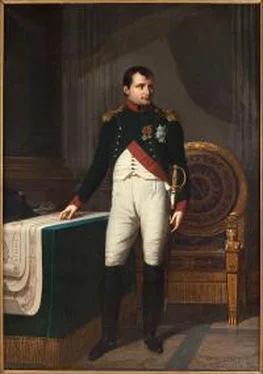Jean Robiquet - Daily Life In France Under Napoleon
Здесь есть возможность читать онлайн «Jean Robiquet - Daily Life In France Under Napoleon» весь текст электронной книги совершенно бесплатно (целиком полную версию без сокращений). В некоторых случаях можно слушать аудио, скачать через торрент в формате fb2 и присутствует краткое содержание. Жанр: История, на английском языке. Описание произведения, (предисловие) а так же отзывы посетителей доступны на портале библиотеки ЛибКат.
- Название:Daily Life In France Under Napoleon
- Автор:
- Жанр:
- Год:неизвестен
- ISBN:нет данных
- Рейтинг книги:4 / 5. Голосов: 1
-
Избранное:Добавить в избранное
- Отзывы:
-
Ваша оценка:
- 80
- 1
- 2
- 3
- 4
- 5
Daily Life In France Under Napoleon: краткое содержание, описание и аннотация
Предлагаем к чтению аннотацию, описание, краткое содержание или предисловие (зависит от того, что написал сам автор книги «Daily Life In France Under Napoleon»). Если вы не нашли необходимую информацию о книге — напишите в комментариях, мы постараемся отыскать её.
Daily Life In France Under Napoleon — читать онлайн бесплатно полную книгу (весь текст) целиком
Ниже представлен текст книги, разбитый по страницам. Система сохранения места последней прочитанной страницы, позволяет с удобством читать онлайн бесплатно книгу «Daily Life In France Under Napoleon», без необходимости каждый раз заново искать на чём Вы остановились. Поставьте закладку, и сможете в любой момент перейти на страницу, на которой закончили чтение.
Интервал:
Закладка:
Really, Corinne had some odd ideas about life in the provinces!
CHAPTER XXI. A BATTLE EXTRAORDINARY
The two bread crises: 1801 and 1811 - The bakers' grievances - Paris does not like black bread — The Reserves are thrown in — Disquieting rise in prices — Robespierre's maximum — Flour goes into hiding - Tardy solution of the crisis 1811 — the year of the King of Rome, of the comet and of a famous wine — was greeted by the people of that day as a period of relative peace.
Napoleon had not taken the field himself since Wagram. He left his lieutenants to fight, and only too often to be beaten, on the other side of the Pyrenees, but for the last twenty months he had remained almost entirely in the neighbourhood of the Tuileries, Saint-Cloud, Fontainebleau and Compiegne, spending his time between the cares of politics and die joys of recent paternity.
But during this sort of breathing-space that the god of war allowed himself, he was suddenly forced, after all, to fight a battle. Although history hardly mentions it, it was nevertheless a pretty fierce one, and there may be some interest in reviving the memory of it after the trials of the same nature that our own generation has just gone through. This battle of 1811-12, which bears no name in the textbooks, might be called the 'Battle of the Bread'.
Up to the middle of summer the harvests had promised to be very good. But towards the end of July thunderstorms had broken out, devastating Beauce and Brie. In the Midi torrid heat had roasted the crops where they stood, and it was clear that the cereal product would be less than mediocre everywhere. Now a lack of corn in a country where so much bread is eaten as in France must always be a serious matter. Having been through the Revolution, the Emperor knew this better than anybody: he did not forget that most popular uprisings of the past have begun in front of empty bakeries. Hence his policy in the matter of victualling. 'Is it wise to let corn be sold dear when nature provides it in abundance?' was one of his favourite sayings, and he certainly thought that when she remained ungenerous, corn should still remain cheap.
It was with this idea that, from the beginning of the Consulate, he had regulated the trade, reducing the number of bakers so as to keep a better hold over them, building up substantial reserves of flour and throwing them on the market when supplies began to dwindle, fighting obstinately, in short, against the threats of famine that had always been his nightmare.
An early crisis, in the year X, had come near to being very serious. With a good third of the usual production lacking, the price of bread had suddenly gone up. The four-pound loaf, which usually cost from twelve to thirteen sous, was already selling at eighteen by the beginning of the autumn of 1801. A cartload of bread was pillaged in the open street, Rue Saint-Honore, and in working-class quarters people were not afraid of declaring that the bakers deserved to be guillotined.
There was the same unrest in the provinces: trouble had broken out in Amiens that cost an officer his life. It was said that the people of Rouen had murdered their Mayor and burnt down the market hall at Darnetal. Other affrays took place in the Oise, the Aisne and Seine-et-Marne, where the people of Provins had held up a boat loaded with flour.
To restore order, at any rate in Paris, the Consular authorities had commissioned a private society, the Compagnie Bendecker, behind which the inevitable Ouvrard was probably manoeuvring, to purchase considerable quantities of corn in Belgium and the Vendee, to be sold to the trade at a loss. In this way the ovens had been kept going, but at what a price! The operation, once over, was found to have cost more than fifteen and a half millions.
There followed, fortunately, a whole series of fat years. In spite of the rupture of the Treaty of Amiens, the four-pound loaf had gone down to twelve sous again in 1803, then to eleven, and even to the incredible price of nine, in 1804, the rise occurring afterwards remaining very slight. Seven years later the loaf still cost from thirteen to fourteen sous, and the public had become so accustomed to this price that the idea of a change did not occur to it.
Consternation was all the greater, therefore, when towards the middle of summer, 1811, it was known that flour was about to become scarce again. Victims of the drought already mentioned, the Departments of the Midi had drawn heavily on the region of Paris, and the 1,300 sacks per day required for the provisioning of the capital could not be found.
All governments are alike. When a problem perplexes them, they set up a commission with instructions to study it. Napoleon, for all his genius, could not do otherwise. An Administrative Council was created, known as the Conseil des Subsistances^ and under the presidency of Montalivet, and later of Comte de Sussy, Minister of Commerce, certain high officials such as Maret, Director of Supplies, Pasquier, the new Prefect of Police, Dubois, his predecessor, and Real, Councillor of State, met to palaver every week. What came of their deliberations? To start with, a bulk purchase of 6,000 quintals of Flemish corn, which allowed the reserves to be built up again to some extent, but had the drawback of sending up the market price. Since flour was costing more and more, the bakers were not long in asking permission to raise the price of bread a little. It was then that the battle started. On one side were the shopkeepers trying to avoid ruin, on the other a Government anxious to prevent a rise, the unpopularity of which it could foresee.
Intervening in person, the Emperor first thought of a system of subsidies. The State was to pay five francs per sack to every baker buying flour. A credit set aside for this purpose was consumed in a few weeks, and it was patent that it had done nothing to improve the situation in the trade.
Early every morning the bakers' shops were invaded and rapidly cleared out. It was all the more difficult for them to satisfy their usual customers, because people from the suburbs, attracted by the difference in price, had formed the habit of coming to buy their bread in Paris. "For some days now*, writes the Prefect of Police, 'the bakers have noticed people they had never seen before, buying four or five loaves at a time; people from the country have asked for as many as eight four-pound loaves at the same shop. It is thought that some are being exported to Versailles, Arpajon, Long-jumeaux, Poissy and elsewhere, and even to Mantes/
The same thing was happening on a grand scaje with regard to the sale of flour. The stocks of Chartres and Etampes were going off to the Quest, those of Picardy up to Artois and those of Brie down to Lyons and Marseilles, so that a circle of dearth was growing round the capital.
In the city itself certain symptoms, familiar to old Parisians, already portended the crisis: the run on dried vegetables, at no matter what price, and the barrels of boiled potatoes that housewives were fighting for in the open street, around the Cornmarket — or rather, the Market without Corn.
Aware of the turn things were taking, Savary, Minister of Police, thought it advisable to inform the Emperor, now on his way back from Holland via the Rhine Provinces; but at first he only drew from him a somewhat contemptuous reply: C I have received your letter of October 30. You in Paris are like children; you lose your heads from fright. What will it be like when bread is at eighteen sous and the bakers have used up their stocks? You must take precautions but not lose your head. Never be frightened. Fear never does any good. All you have to do is to await my orders for five or six days.'
In spite of his apparent phlegm, Napoleon must have taken the subject seriously, for on his return to Saint-Cloud he hastened to authorize the increase in price that he had always forbidden up to then. Bread went up by one sou.
Читать дальшеИнтервал:
Закладка:
Похожие книги на «Daily Life In France Under Napoleon»
Представляем Вашему вниманию похожие книги на «Daily Life In France Under Napoleon» списком для выбора. Мы отобрали схожую по названию и смыслу литературу в надежде предоставить читателям больше вариантов отыскать новые, интересные, ещё непрочитанные произведения.
Обсуждение, отзывы о книге «Daily Life In France Under Napoleon» и просто собственные мнения читателей. Оставьте ваши комментарии, напишите, что Вы думаете о произведении, его смысле или главных героях. Укажите что конкретно понравилось, а что нет, и почему Вы так считаете.












